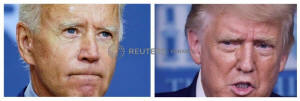Wall Street fundraisers turn into wallflowers during 2020 U.S. election
 Send a link to a friend
Send a link to a friend
 [September 14, 2020]
By Svea Herbst-Bayliss [September 14, 2020]
By Svea Herbst-Bayliss
BOSTON (Reuters) - Early this year, a
prominent billionaire tried several times to organize a fundraiser for
presidential candidate Pete Buttigieg, a moderate who gained favor among
Wall Street Democrats.
No one responded to the outreach, and the fundraiser never happened, two
people familiar with the matter said.
That was just one sign that Wall Street has become a detour on the road
to the White House, more than a dozen hedge fund managers, bankers and
political analysts told Reuters.
Wealthy bigwigs who were once super-fundraisers now find themselves
largely sidelined ahead of the Nov. 3 presidential election.
The financial industry has so far donated $83 million to the 2020
presidential campaigns of Republican President Donald Trump and
Democratic candidate Joe Biden, according to Center for Responsive
Politics data through July 31.

Although that figure is up 6% from the same period in 2016, the
industry's proportion of overall dollars donated has fallen to 9% from
14%.
"Eight years ago, we were super important. Four years ago, we were very
important. And now we are no longer as relevant or important," said one
billionaire hedge fund manager who, like most, spoke on the condition of
anonymity to avoid backlash. "I've got a lot less influence."
Wall Street's influence in elections is waning because its money is not
as critical as it once was as grassroots contributions soar. And a harsh
political and economic climate makes politicians and bankers want to
steer clear of each other.
In the 2016 election, 26% of Trump's donations came from individuals
contributing less than $200 while 19% of Clinton's donations fit that
profile, according to the Center for Responsive Politics.
Those were higher than prior election cycles, and the trend has only
accelerated since then, especially for candidates who promise to shake
up the establishment. Nearly 80% of New York Representative Alexandria
Ocasio-Cortez' fundraising comes from small individual donations,
according to CRP data.
"The big bundlers are becoming less and less relevant," said Robert
Wolf, a former UBS Group AG <UBSG.S> executive and prominent Democratic
fundraiser, referring to those who amass contributions for campaigns.
"This change has been coming since the 2008 financial crisis and became
really noticeable in 2016."
When Wall Street's political clout was at its peak, candidates and
donors would rub elbows over cocktails and hors d'oeuvres at posh
fundraising parties.
The coronavirus pandemic has put a stop to that, while also gutting the
economy and throwing millions of Americans out of work.
That makes the optics of schmoozing with wealthy Wall Streeters
untenable for candidates mindful of the roasting Democratic candidate
Hillary Clinton received for paid talks to Goldman Sachs <GS.N> bankers
in 2016.
Biden, whose campaign declined to comment, has mostly turned a cold
shoulder to the industry, though he attended at least one $35,000-a-head
Zoom fundraiser this summer with financiers, according to a participant.
In his three decades as a Delaware senator, Biden was closer to Wall
Street. Notably, he backed tough personal bankruptcy rules favored by
banks and credit-card companies, many of which were based in his state.
[to top of second column]
|

A combination picture shows democratic U.S. presidential nominee and
former Vice President Joe Biden pausing while speaking about U.S.
President Donald Trump's reported remarks about fallen U.S. military
personnel, at a campaign event in Wilmington, Delaware, U.S., and
U.S. President Donald Trump speaking during a news conference at the
White House in Washington, U.S., September 4, 2020. REUTERS/Kevin
Lamarque/Leah Millis/File Photo

Even so, he doesn't have a personal network on Wall Street as
candidates like Clinton had, and has cast himself as a defender of
working-class Americans and labor unions.
"Biden doesn't really like rich people and doesn't see himself as a
Wall Street person," said Jeff Hauser, founder of Revolving Door
Project, which scrutinizes executive branch appointments.
Trump, who was born and spent his business career in New York, has
had warmer relations with Wall Street. But even he is not relying on
donations from the financial industry. The Trump campaign did not
respond to requests for comment.
The president, who appointed former bankers to his cabinet, has this
year consulted with bankers and hedge fund managers, including
Steven A. Cohen and Kenneth Griffin, on how to reopen the economy
after coronavirus.
In August, he attended a Long Island fundraiser hosted by
billionaire hedge fund manager John Paulson, according to someone
apprised of the event.
However, Trump portrays himself as a straight-talking, anti-elitist
candidate and occasionally needles people like JPMorgan Chase & Co <JPM.N>
CEO Jamie Dimon on Twitter.
POLITICAL DISTANCING
Just as candidates want to distance themselves from Wall Street,
finance types do not want to attract attention with big public
donations.
Financiers fear the country's economic crisis and deep political
divides may make them – and their firms – targets for criticism from
both the political left and right.
"Trump has disrupted the whole circuitry of Wall Street being
involved in elections," said Anthony Scaramucci, who served as
Trump's communications director and is now an opponent.

Even some finance executives who support Trump and have benefited
from tax cuts and deregulation during his tenure said they fear
retribution for publicly supporting him.
Nevertheless, Wall Street detractors say the Wall Street quietly
retains outsize influence because of its deep pockets and strategic
lobbying.
Dennis Kelleher, president of nonprofit group Better Markets, calls
the industry's "mountain of money" dangerous. "Small dollar
contributions simply cannot compete with that at the presidential
level," he said.
(Reporting by Svea Herbst-Bayliss; Additional reporting by Pete
Schroeder and Trevor Hunnicutt; Editing by Lauren Tara LaCapra and
Cynthia Osterman)
[© 2020 Thomson Reuters. All rights
reserved.] Copyright 2020 Reuters. All rights reserved. This material may not be published,
broadcast, rewritten or redistributed.
Thompson Reuters is solely responsible for this content. |